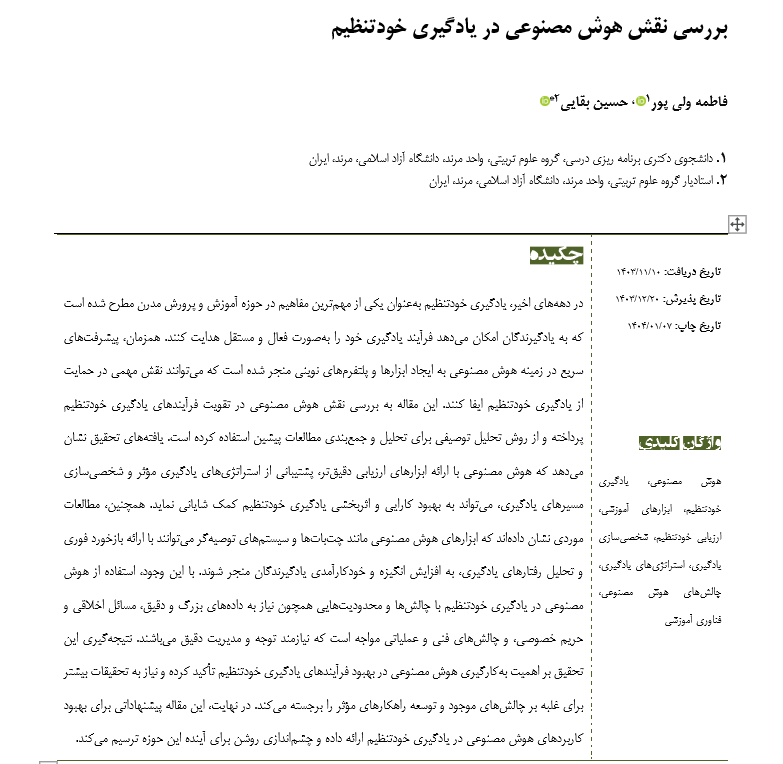بررسی نقش هوش مصنوعی در یادگیری خودتنظیم
کلمات کلیدی:
هوش مصنوعی, یادگیری خودتنظیم, ابزارهای آموزشی, ارزیابی خودتنظیم, شخصیسازی یادگیری, استراتژیهای یادگیری, چالشهای هوش مصنوعی, فناوری آموزشیچکیده
در دهههای اخیر، یادگیری خودتنظیم بهعنوان یکی از مهمترین مفاهیم در حوزه آموزش و پرورش مدرن مطرح شده است که به یادگیرندگان امکان میدهد فرآیند یادگیری خود را بهصورت فعال و مستقل هدایت کنند. همزمان، پیشرفتهای سریع در زمینه هوش مصنوعی به ایجاد ابزارها و پلتفرمهای نوینی منجر شده است که میتوانند نقش مهمی در حمایت از یادگیری خودتنظیم ایفا کنند. این مقاله به بررسی نقش هوش مصنوعی در تقویت فرآیندهای یادگیری خودتنظیم پرداخته و از روش تحلیل توصیفی برای تحلیل و جمعبندی مطالعات پیشین استفاده کرده است. یافتههای تحقیق نشان میدهد که هوش مصنوعی با ارائه ابزارهای ارزیابی دقیقتر، پشتیبانی از استراتژیهای یادگیری مؤثر و شخصیسازی مسیرهای یادگیری، میتواند به بهبود کارایی و اثربخشی یادگیری خودتنظیم کمک شایانی نماید. همچنین، مطالعات موردی نشان دادهاند که ابزارهای هوش مصنوعی مانند چتباتها و سیستمهای توصیهگر میتوانند با ارائه بازخورد فوری و تحلیل رفتارهای یادگیری، به افزایش انگیزه و خودکارآمدی یادگیرندگان منجر شوند. با این وجود، استفاده از هوش مصنوعی در یادگیری خودتنظیم با چالشها و محدودیتهایی همچون نیاز به دادههای بزرگ و دقیق، مسائل اخلاقی و حریم خصوصی، و چالشهای فنی و عملیاتی مواجه است که نیازمند توجه و مدیریت دقیق میباشند. نتیجهگیری این تحقیق بر اهمیت بهکارگیری هوش مصنوعی در بهبود فرآیندهای یادگیری خودتنظیم تأکید کرده و نیاز به تحقیقات بیشتر برای غلبه بر چالشهای موجود و توسعه راهکارهای مؤثر را برجسته میکند. در نهایت، این مقاله پیشنهاداتی برای بهبود کاربردهای هوش مصنوعی در یادگیری خودتنظیم ارائه داده و چشماندازی روشن برای آینده این حوزه ترسیم میکند.
دانلودها
مراجع
Chang DH. Educational Design Principles of Using AI Chatbot That Supports Self-Regulated Learning in Education:
Goal Setting, Feedback, and Personalization. Sustainability. 2023;15(17):12921. doi: 10.3390/su151712921.
Järvelä S, Nguyen A, Hadwin AF. Human and Artificial Intelligence Collaboration for Socially Shared Regulation in
Learning. British Journal of Educational Technology. 2023;54(5):1057-76. doi: 10.1111/bjet.13325.
Du H. Exploring the Effects of AI Literacy in Teacher Learning: An Empirical Study. Humanities and Social Sciences
Communications. 2024;11(1). doi: 10.1057/s41599-024-03101-6.
Hartley K. Artificial Intelligence Supporting Independent Student Learning: An Evaluative Case Study of ChatGPT
and Learning to Code. Education Sciences. 2024;14(2):120. doi: 10.3390/educsci14020120.
Ng DTK. Empowering Student Self‐regulated Learning and Science Education Through ChatGPT: A Pioneering Pilot
Study. British Journal of Educational Technology. 2024;55(4):1328-53. doi: 10.1111/bjet.13454.
Chiu TKF. A Classification Tool to Foster Self-Regulated Learning With Generative Artificial Intelligence by
Applying Self-Determination Theory: A Case of ChatGPT. Educational Technology Research and Development.
;72(4):2401-16. doi: 10.1007/s11423-024-10366-w.
Jin S-H, Im K, Yoo M, Roll I, Seo K. Supporting Students’ Self-Regulated Learning in Online Learning Using
Artificial Intelligence Applications. International Journal of Educational Technology in Higher Education. 2023;20(1). doi:
1186/s41239-023-00406-5.
Capinding AT. Development and Validation of Instruments for Assessing the Impact of Artificial Intelligence on
Students in Higher Education. International Journal of Educational Methodology. 2024;volume-10-2024(volume-10-issue-2-
may-2024):197-211. doi: 10.12973/ijem.10.2.997.
Wu TT, Lee HY, Li P-H, Huang C-N, Huang YM. Promoting Self-Regulation Progress and Knowledge Construction
in Blended Learning via ChatGPT-Based Learning Aid. Journal of Educational Computing Research. 2023;61(8):3-31. doi:
1177/07356331231191125.
Song D. Artificial Intelligence for Human Learning: A Review of Machine Learning Techniques Used in Education
Research and a Suggestion of a Learning Design Model. American Journal of Education and Learning. 2024;9(1):1-21. doi:
55284/ajel.v9i1.1024.
Yang Y. Enhancing Students' Metacognition via AI-Driven Educational Support Systems. International Journal of
Emerging Technologies in Learning (Ijet). 2023;18(24):133-48. doi: 10.3991/ijet.v18i24.45647.
Wei L. Artificial Intelligence in Language Instruction: Impact on English Learning Achievement, L2 Motivation, and
Self-Regulated Learning. Frontiers in Psychology. 2023;14. doi: 10.3389/fpsyg.2023.1261955.
Yan W. Benefits and Challenges of Collaboration Between Students and Conversational Generative Artificial
Intelligence in Programming Learning: An Empirical Case Study. Education Sciences. 2024;14(4):433. doi:
3390/educsci14040433.
Qiao H. Artificial Intelligence-Based Language Learning: Illuminating the Impact on Speaking Skills and SelfRegulation in Chinese EFL Context. Frontiers in Psychology. 2023;14. doi: 10.3389/fpsyg.2023.1255594.
Molenaar I. The Concept of Hybrid Human-Ai Regulation: Exemplifying How to Support Young Learners’ SelfRegulated Learning. Computers and Education Artificial Intelligence. 2022;3:100070. doi: 10.1016/j.caeai.2022.100070.
Molenaar I, Mooij Sd, Azevedo R, Bannert M, Järvelä S, Gašević D. Measuring Self-Regulated Learning and the Role
of AI: Five Years of Research Using Multimodal Multichannel Data. Computers in Human Behavior. 2023;139:107540. doi:
1016/j.chb.2022.107540.
Hopfenbeck TN. Challenges and Opportunities for Classroom-Based Formative Assessment and AI: A Perspective
Article. Frontiers in Education. 2023;8. doi: 10.3389/feduc.2023.1270700.
Jia X-H. Towards a New Conceptual Model of AI-Enhanced Learning for College Students: The Roles of Artificial
Intelligence Capabilities, General Self-Efficacy, Learning Motivation, and Critical Thinking Awareness. Systems.
;12(3):74. doi: 10.3390/systems12030074.

دانلود
چاپ شده
ارسال
بازنگری
پذیرش
شماره
نوع مقاله
مجوز
حق نشر 2025 نشریه پژوهش و نوآوری در تربیت و توسعه

این پروژه تحت مجوز بین المللی Creative Commons Attribution-NonCommercial 4.0 می باشد.










